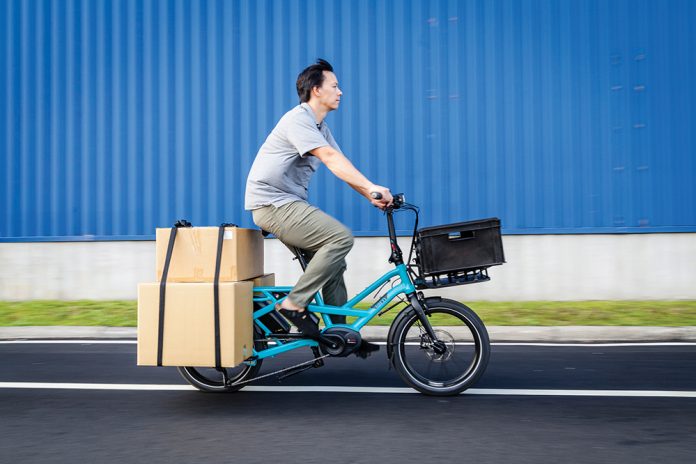Electric Cargo Bikes are becoming more and more popular. A combination of advancing technology, concern over air quality and the environment and of course budgetary reasons has seen what was once a very niche delivery method, turn into a truly viable transport option for many businesses, even those based in the hilliest of cities.
Like riding a traditional bike, an electric cargo bike still needs pedalled. However, the rider isn’t left to struggle and pedal the load on their own. The electric assist gives the rider extra power (pedal assistance of up to 300%) for carrying heavy loads (up to 200kg or 440lbs) uphill while not needing to over-exert themselves.
Do the Maths
There are several benefits to using an electric cargo bike over a van. As seen in the infographic, the price difference is astounding.
Starting at £4,000, electric cargo bikes are a significantly lower investment than purchasing a traditional delivery vehicle. Interest free loans for e-cargo bikes can be applied for through The Energy Saving Trust. These loans are repayable over four years significantly reducing the initial outlay cost.
The running costs over a year are notably lower too. There is no vehicle excise duty to pay, no parking charges and the cost of recharging is considerably less than fuel.
Customer Support
As much as the financial aspect of an electric cargo bike might seem important. There are plenty of other factors to consider. One of which being your customers:
In a large-scale report, 63% of respondents stated they were concerned or extremely concerned about air pollution. Additionally, a recent study by Unilever found a third of consumers are now choosing to buy from brands they believe are doing social or environmental good.
This presents a big opportunity for businesses who want to improve their environmental impact and improve air quality while also giving customers an additional reason to do business with you and not a competitor. A cargo bike branded up with company logos and contact details becomes a free advertising platform in the locations where your customers (or potential customers) are found.
The Practical Choice
Practicality is also a major factor. If your load would be around 200kg (440lbs) or less and most of your journeys are within a city or limited geographical location, it might be faster and easier using a cargo bike – there could well be traffic free routes to avoid congestion and parking becomes a lot easier too.
Even businesses who travel over larger distances have already started to think about making their ‘last mile’ deliveries more sustainable. For example, an initiative by Pedal & Post sees courier vans drop off parcels at a hub location to then make local deliveries within Oxford by cargo bike. Like many cities, Oxford has congestion problems and parking restrictions which means it is often quicker to do these last mile deliveries by cargo bike.
The other advantage is that no licence is needed. Whereas with a van, driving duties might be restricted to only those with driving licences, anyone can ride an electric cargo bike. With the electric assist, it doesn’t require riders to be elite athletes either.
Cargo Bike Features
Depending on the make and model chosen, the features of an e-cargo bike will also differ.
The Tern GSD S00 for example is the same length as a regular bike and can be stored on its end for ease of storage. As it can also fit in a car, it’s a perfect option if the cargo bike was to be used for ‘last mile’ deliveries or visits.
The Riese & Muller cargo bikes on the other hand look more like traditional cargo bikes with large load carrying capacity on the front. Although if you need additional space, there is always the option of an extra carrier on the back too.
Try out an Electric Cargo Bike
Pop in-store or give us a call and book yourself a demo to try it out for you and your business –
Edinburgh Bruntsfield:
8 Alvanley Terrace, EH9 1DU
Edinburgh Canonmills:
30 Rodney Street, EH7 4EA
Aberdeen:
458-464 George Street, AB25 3XH
www.edinburghbicycle.com
0345 257 0808






